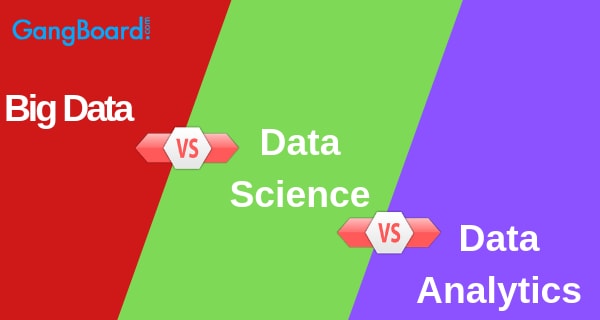
Big Data vs Data Science vs Data Analytics
Big Data vs Data Science vs Data Analytics
Though these three terms are synonymous with data, each of them is unique in their application areas and the concepts. In the past some years, the data is sprinting at a faster pace with each person contributing about 1.7 MB in just a second. The growing pace of the data booming market has led to the creation of digital marketing, social media integration, and what not on the digital platform. This growing demand for mining of data to the conversion of these data into knowledge and information has led to the three distinct terms which people often confuse. Through this article, we will not only ventilate the key differences between them but we will also help you gauge on the aspects and fields to which they can be used. So, without further ado let us have our analysis ready for big data vs. data science vs. data analytics.
Difference Between Big Data, Data Science, and Data Analytics
Big data generally indicates large volumes of data that are available on the internet or other platforms through which various data can be obtained in different formats. So, basically, these are the data sources which have the potential to provide essential insights on analysis which can lead to better decision making and business moves.
Data science, however, is an extension of mathematics and statistics that use different statistical tools and models imbibed in a machine or computer algorithm to cleanse data set, analyze them, and discover the latent patterns from a data set. It helps in problem-solving however, a particular algorithm needs to be fed to the computer along with the models to process data and reduce it to predictive results.
Data analytics, on the other hand, refers to the science of examining a data set that is used for the purpose of drawing legitimate conclusions from the analysis which leads to knowledge and information that involves pre-processing, an inspection of missing data and noise, and transformation of data to suit the needs of the algorithm.
Key concepts related to Big Data, Data Science, and Data Analytics
| Basis of differentiation | Big Data | Data Science | Data Analytics |
| Definition | Unprocessed data sets of humongous volumes | Science of cleaning, preparing and aligning the data for analysis using statistical and mathematical models | It is related to examining raw data which is required to provide conclusive information |
| Applications | Financial services Fraud analytics Communication industry to retain and expand the consumer base Brick-and-mortar and online retailer for better customer service |
Delivery of better search results on the internet Digital advertisements from display banners to finding the appropriate prospects The recommender system to help in the user experience |
Gaining efficiency in the Healthcare Optimization of buying experience through mobile and social media data analysis. Collection of data in the gaming industry Energy management |
| Skill requirements | In order to become a big data professional, the following skills are required:
|
A data scientist must highlight a profile that has the following skills:
|
Following skills are necessary to become a data analyst:
|
Conclusion
In any stint of big data vs. data science vs. data analytics, one thing is common for sure and that is data. So, all the professionals from these varied fields belong to data mining, pre-processing, and analyzing the data to provide information about the behavior, attitude, and perception of the consumers that helps the businesses to work more efficiently and effectively. While big data is associated with large volumes of data, data analytics is used to process the data to extract information and valuable knowledge with the help of a tool known as data science.


 +1 201-949-7520
+1 201-949-7520 +91-9707 240 250
+91-9707 240 250